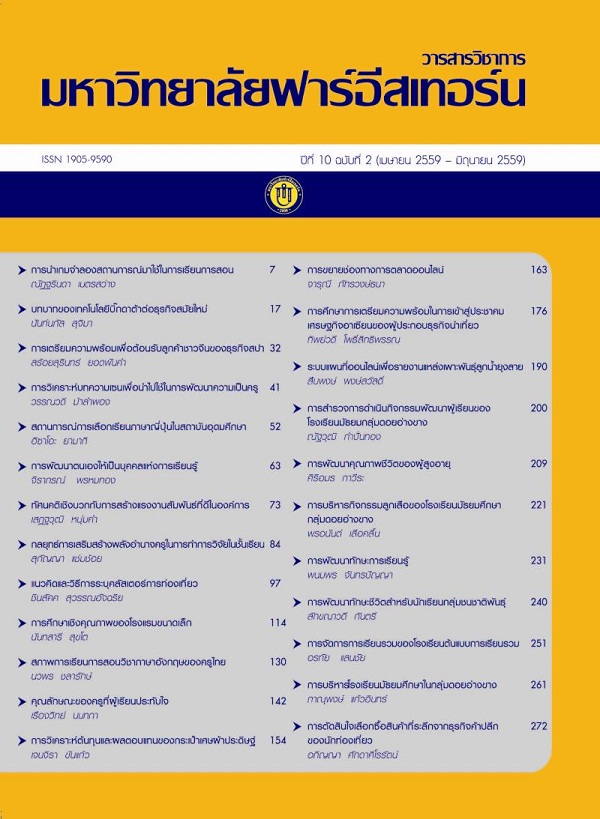บทบาทของเทคโนโลยีบิ๊กดาต้าต่อธุรกิจสมัยใหม่ และซอฟต์แวร์โอเพนซอร์สที่เกี่ยวข้อง
Main Article Content
Abstract
ปริมาณข้อมูลในยุคสังคมดิจิตอลมีปริมาณเพิ่มขึ้นอย่างรวดเร็ว จากหลายแหล่งข้อมูล และหลากหลายลักษณะทั้งแบบมีโครงสร้าง และไม่มีโครงสร้าง บิ๊กดาต้า หมายถึงปริมาณข้อมูลขนาดใหญ่ที่ประกอบด้วย 5 องค์ประกอบ คือ ปริมาณ ความหลากหลาย ความรวดเร็ว ความผันแปร และคุณค่าที่นำเสนอ หากผู้ประกอบการสามารถวิเคราะห์บิ๊กดาต้าเพื่อให้เกิดคุณค่าทางธุรกิจได้ ย่อมส่งผลให้ได้เปรียบทางธุรกิจเหนือคู่แข่ง ปัจจุบันมีเทคโนโลยีบิ๊กดาต้าทั้งในรูปแบบของซอฟต์แวร์โอเพนซอร์ส และซอฟต์แวร์ทางการค้า ขึ้นอยู่กับความเหมาะสมกับประเภทการใช้งาน และขนาดของธุรกิจ การใช้เทคโนโลยีดังกล่าวผู้ประกอบการธุรกิจต้องเตรียมความพร้อมทั้งในด้านข้อมูล โครงสร้างพื้นฐานทางด้านเทคโนโลยี และบุคลากร ซึ่งอาจจะเหมาะสำหรับธุรกิจขนาดใหญ่ สำหรับธุรกิจขนาดเล็กที่มีต้นทุนไม่มาก สามารถใช้บริการบริษัทที่ทำการวิเคราะห์ข้อมูลโดยเฉพาะ หากต้องการทราบเรื่องใดทางบริษัทจะดำเนินการวิเคราะห์ และขายเป็นรายงานให้ในลักษณะการคิดค่าบริการตามการใช้งานจริง (Pay Per Use) ในบทความนี้นำเสนอข้อมูลเกี่ยวกับ ฮาดูป (Hadoop) ซึ่งเป็นซอฟต์แวร์โอเพนซอร์ส ที่นิยมใช้ในระบบการจัดเก็บ และประมวลผลข้อมูลบิ๊กดาต้า การใช้งานต้องพัฒนาด้วยโปรแกรมภาษาจาวา ซึ่งไม่สะดวกสำหรับผู้ใช้บางราย จึงทำให้มีการสร้างเครื่องมือเพื่อใช้งานร่วมกับฮาดูป ส่งผลให้การประมวลผลข้อมูลสะดวก และเหมาะสมกับผู้ใช้โดยทั่วไป
บทความนี้จะเป็นประโยชน์สำหรับผู้ประกอบการที่ต้องการวิเคราะห์ข้อมูลบิ๊กดาต้าด้วยซอฟต์แวร์โอเพนซอร์ส โดยนำเสนอเกี่ยวกับฮาดูป และเครื่องมือที่ทำงานร่วมกับฮาดูป รวมถึงการวิเคราะห์บิ๊กดาต้าทางด้านการตลาดโดยซอฟต์แวร์ ออราเคิล โซเชียล รีเลชันชิพ เมเนจเม้นท์ (Oracle Social Relationship Management) ในการจับฟีดแบ็กของผู้บริโภคจากเว็บไซต์ และเครือข่ายสังคมออนไลน์ เพื่อให้นักการตลาดสามารถวิเคราะห์ข้อมูล และกำหนดทิศทางในการทำการตลาดได้อย่างรวดเร็ว
The amount of data in digital society is increasing rapidly from many sources of data both structured and unstructured. Big data is a large volume of data which consists of 5Vs, Volume, Variety, Velocity, Variability and Value proposition. Analyzing Big Data allows entrepreneurs to gain advantages over their competitors. Big Data technology provides in both open source and commercial solutions, depending on entrepreneurs needs. A user has to provide data, infrastructure of technology and people. These components are suitable for enterprise-level applications. Small SMEs can access this service by pay per use from a specific data analysis company to reduce the cost. This article presents Hadoop, which is an open source software framework for storing and processing Big Data. To use hadoop for big data analysis, users must implement solutions via java programming language, which may inconvenient for some. As a result, a number of Hadoop tools have been put forward to ease the problem.
This article is beneficial for entrepreneurs who want to analyze big data with open source software: Hadoop and Hadoop tools. Moreover, Oracle Social Relationship Management also utilize those who analyze big data in marketing to get consumer’s feedback from websites and social network in order to analyze and set market direction rapidly by marketeer.
Article Details
1. Any views and comments in the Journal of Social Innovation and Lifelong Learning are the authors’ views. The editorial staff have not to agree with those views and it is not considered as the editorial’s responsibility.
2. The responsibility of content and draft check of each article belongs to each author. In case, there is any lawsuit about copyright infringement. It is considered as the authors’ sole responsibility.
3. The article copyright belonging to the authors and The Far Eastern University are copyrighted legally. Republication must be received direct permission from the authors and The Far Eastern University in written form.
References
กมลภัทร บุญค้ำ. (2558). TURNING BIG DATA INTO DATA ANALYTICS. สืบค้นเมื่อ 12 เมษายน 2559, จาก http://www.theeleader.com/turning-big-data-data-analytics/.
ณรงค์ฤทธิ์ มโนมัยพิบูลย์. (2557).ประยุกต์ Big Data ในงานธุรกิจ. Gmagz. (ฉบับที่ 37), 19-20.
ธนชาติ นุ่มนนท์. (2557). Hadoop Ecosystem สำหรับการพัฒนา Big Data. สืบค้นเมื่อ 30 มีนาคม 2559, จาก https://thanachart.org/2014/10/18/ปี-2014-hadoop-ecosystem-สำหรับการพัฒนา-big-data/.
ธนชาติ นุ่มนนท์. (2558). ปี 2015 จะเป็นปีเริ่มต้นของ Big Data Analytics. สืบค้นเมื่อ 30 มีนาคม 2559, จาก https://thanachart.org/2015/01/02/ปี-2015-จะเป็นปีเริ่มต้นของ-big/.
พนิดา ตันศิริ. (2556). ข้อมูลขนาดใหญ่กับความท้าทาย. วารสารนักบริหาร. ปีที่ 33 (ฉบับที่ 1), 15-21.
ศรีสมรัก อินทุจันทร์ยง. (2558). Big Data จำเป็นสำหรับทุกองค์การหรือไม่. วารสารนักบริหาร. ปีที่ 38 (ฉบับที่ 146), 1-8.
สุกิจ คูชัยสิทธิ์. (2556). การเข้าสู่โลกยุคใหม่ของข้อมูล “บิ๊กดาต้า”. วารสารนักบริหาร. ปีที่ 33 (ฉบับที่ 1), 22-28.
สุรนาถ เนียมคำ. (2558). Big Data คืออะไร? + วิธีใช้ Hadoop/Spark บน Cloud Dataproc. สืบค้นเมื่อ 5 เมษายน 2559, จาก http://www.siamhtml.com/getting-started-with-big-data-and-hadoop-spark-on-cloud-dataproc/.
ASTV ผู้จัดการออนไลน์. (2557). ISSP ผนึกพลังพันธมิตร Oracle ให้บริการ Oracle SRM. สืบค้นเมื่อ 13 เมษายน 2559, จาก http://www.manager.co.th/Cyberbiz/ViewNews.aspx?NewsID= 9570000115734.
DOMO. (2015). DATA NEVER SLEEPS 3.0. Retrieved 13 April 2016, from https://www.domo.com/learn/data-never-sleeps-3-0.
ETCenter. (2015). Effective Big Data Solution for Content Owners. Retrieved 13 April 2016, from http://www.slideshare.net/ETCenter/5-onprem-and-the-cloud-effective-big-data-solutions-and-services-for-content-owners.
ORACLE. (2016). Oracle Social Relationship Management. Retrieved 13 April 2016, from https://cas.vitrue.com/logout.
Sachin P Bappalige. (2557). An introduction to Apache Hadoop for big data. Retrieved 12 April 2016, from https://opensource.com/life/14/8/intro-apache-hadoop-big-data.
Sandra, R., Delen, D., and Turban, E. (2015). Business Intelligence and Analytics: Systems for Decision Support (10th ed,). N.J.: Pearson education.

